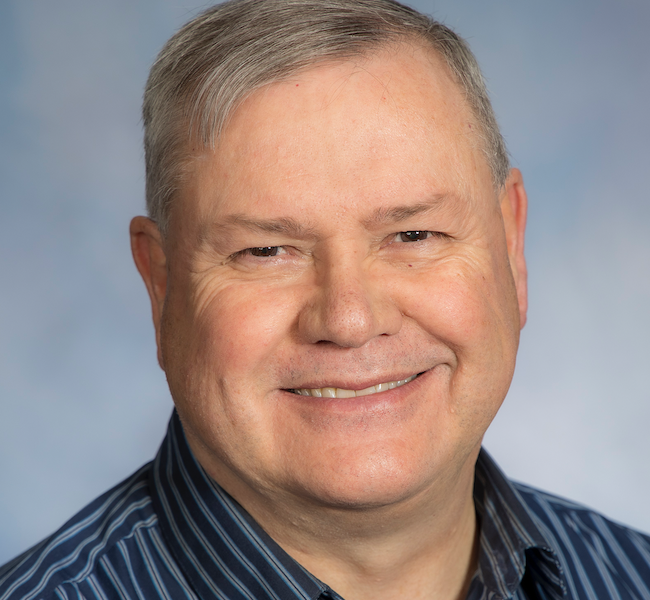
Dr. Doug Eliason (Courtesy/Salem Health)
Dr. Doug Eliason compares efforts to stop the spread of Covid to avoiding a car crash.
“Every time you go to your car and you turn your car on, you know that you’re risking an auto accident that could involve death or serious injury,” he said. “Instead of being paranoid and not driving, I evaluate the risk.”
Eliason, a family medicine doctor at Salem Health’s Boulder Creek clinic, has overseen the clinic’s Covid testing effort while continuing to see his regular patients.
He sees his role as an advisor, helping patients make good decisions in the face of a virus that causes mild illness in most people but can lead to hospitalization, long-term health impacts or death.
Eliason spoke to Salem Reporter last week about how the clinic has responded to Covid, what he tells patients who are reluctant to wear masks and why he thinks virtual Thanksgiving is the best choice for 2020.
On the clinic’s response
Normally, a doctor’s office sees a mix of patients – people with chronic health conditions like diabetes or heart disease who need regular appointments, and people who have a temporary illness like strep throat or the flu.
In March, Salem Health realized that lumping both groups together wouldn’t work well with Covid in the mix. So, they created “respiratory clinics,” converting three existing offices into places to screen patients with Covid-like symptoms so they wouldn’t come through the main waiting area and potentially infect other patients.
“Bringing them into the office means exposing the community to some degree to them,” he said. Their goal was to minimize the risk by separating out patients who potentially had Covid and changing check-in procedures so patients wait in their cars, then get escorted directly to an exam room.
Boulder Creek, Eliason’s clinic, began offering a respiratory clinic in early October, taking over from the River Road clinic in south Salem. They’re now testing just under 100 people per week for Covid.
Eliason said they didn’t want people with other chronic health conditions to avoid seeking care because they feared catching Covid in the waiting room.
With Covid testing now more widely available than in March, Eliason said the severity of a person’s illness doesn’t dictate whether they get a test. Instead, it’s about whether there’s a better explanation for their symptoms – like a very inflamed throat and a positive test for strep.
“Can I explain their symptoms, do I have a good rational explanation for why they’re sick?” he said. If there’s no obvious other explanation, they’ll typically test for Covid.
On a typical case of Covid
While the disease can progress into breathing problems and life-threatening symptoms, Eliason said most cases he’s seen are mild, with symptoms similar to a cold.
“They don’t feel well, but they’re not distinctly sick,” he said. Common symptoms include body aches, head congestion and sometimes a low-grade fever. Typically, those patients are symptom-free in five to seven days, he said, and don’t require medical care beyond advice on how long to quarantine.
“They just need time and some advice on how to manage their symptoms,” he said. Outside the hospital, doctors are most concerned about Covid progressing to difficulty breathing, problems with the lungs or blood clotting – all symptoms of the disease taking a more serious course.
Some “mild” cases which don’t require hospitalization can nevertheless make a person very sick.
“It is a very wide spectrum with this illness. Some people are sicker, they have a measurable fever,” he said.
Some Covid patients seem not to fully recover even months after their initial illness, with lingering symptoms like fatigue, impaired memory and a persistent cough. Eliason said he hasn’t personally cared for those “long-hauler” patients in his practice, but said there’s still a lot of research to be done about why the virus takes such different courses with different people.
“It just appears that some people don’t clear the virus as well,” he said.
On the public health response
For Eliason, there’s no contradiction between the typically mild illness he sees among patients and the public health measures recommended by the Centers for Disease Control and Prevention and Oregon Health Authority to slow the virus’ spread.
While data makes clear older people are at greatest risk from Covid, he said that doesn’t mean young people face no risk.
“We’ve had deaths among all age groups so you can never say by age or health that I won’t have a serious problem from getting Covid. You can just say that my odds are better,” he said.
Covid is often compared to the flu, but Eliason said it’s important to remember it’s still much more fatal, and there’s no Covid vaccine.
“This illness is 10 times more lethal than flu. That hasn’t really changed,” he said. Marion County has to date recorded 124 Covid-related deaths, 1.6% of known cases, and 520 people hospitalized with the virus.
He said the clinic has made plans for the winter to secure a steady supply of testing materials, protective equipment and staffing, and he’s “cautiously optimistic” that stricter public health measures like reducing restaurant capacity will help flatten the curve of new infections.
“I think we have done everything that’s reasonable to prepare but I’ll also tell you that some of this is in the hands of the citizens of Oregon,” he said. “If I could put out a plea it would be please wear a mask, please maintain social distancing, please try to avoid gatherings that are indoors. Any amount of planning us medical people do could be easily overrun if people don’t follow those simple, basic rules.”
Eliason spoke to Salem Reporter before Gov. Kate Brown announced a two-week “freeze” statewide to return restaurants to takeout service only, close gyms and reduce capacity at other retail businesses.
He said the state’s guidelines, including an earlier measure to reduce restaurant capacity and limit indoor social gatherings to no more than six people, make sense.
“I think they’re very reasonable and I don’t think they’re overreacting – not with what we’re seeing around the nation,” he said.
On common-sense precautions
Eliason said for most people, staying safe with Covid means thinking about how their day-to-day actions might help the virus spread and taking steps to reduce risk.
He said holding Thanksgiving virtually this year makes sense, especially in families with people at higher risk for a serious case of Covid.
“We don’t have to be hermits in our home, but we do want to be smart about how we do those things and think about: ‘Is it worth the risk for us to get together?’” he said.
That includes being willing to ask friends and family about steps they’re taking to keep themselves and others safe, and being willing to say no if an event is too risky – just as most people would refuse to drive a car down a steep, icy hill.
That’s still true for people who are themselves at low risk, he said.
For Eliason, the most important reason to follow guidelines like wearing a mask, staying socially distant and avoiding indoor gatherings is to keep the community safe. Someone with a mild case of Covid can still spread the virus to people who are more vulnerable.
“Some of our most valuable and important people are elderly,” he said. “If my behaviors lead them to get sick, that’s kind of shame on me for not doing my part.”
Still, he said he doesn’t shame patients who come into his office with questions or doubts about the effectiveness of wearing a mask or other Covid concerns. It’s not effective at getting them to change their minds, he said, and it’s not the approach doctors typically take with any unhealthy behavior.
He said he explains why masks are effective – they filter out droplets carrying the virus, which are the main way the coronavirus spreads – and urges people to think of precautions as just another way we take care of our neighbors.
“We do it every day. If we see smoke coming from a house, we call the fire department. We look after each other. This is just another way of looking after each other,” he said.
Contact reporter Rachel Alexander: [email protected] or 503-575-1241.
SUPPORT ESSENTIAL REPORTING FOR SALEM – A subscription starts at $5 a month for around-the-clock access to stories and email alerts sent directly to you. Your support matters. Go HERE.

Rachel Alexander is Salem Reporter’s managing editor. She joined Salem Reporter when it was founded in 2018 and covers city news, education, nonprofits and a little bit of everything else. She’s been a journalist in Oregon and Washington for a decade. Outside of work, she’s a skater and board member with Salem’s Cherry City Roller Derby and can often be found with her nose buried in a book.









